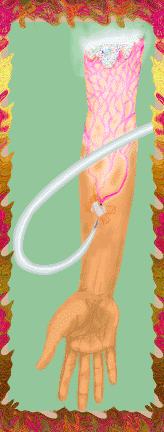 The saline solution is hooked
up.
The saline solution is hooked
up.
I kept the pills around
until
I
decided no way
was I going to palm them
off on anyone for non-prescriptive
use.
Here in the hospital, I'm hooked up and no arguing
about it. A syringe is inserted in the tubing that runs from
the saline bag to the
needle in my arm.
The doctor squeezes off doses at regular
intervals. It sears like acid traveling through my vein: my
forearm's burning from the inside out. I grimace and jerk
uncomfortably.
up and no arguing
about it. A syringe is inserted in the tubing that runs from
the saline bag to the
needle in my arm.
The doctor squeezes off doses at regular
intervals. It sears like acid traveling through my vein: my
forearm's burning from the inside out. I grimace and jerk
uncomfortably.
"Stop that! This doesn't
hurt
so much," the
doctor says,
her strong German accent sounding
particularly
admonishing.
She's wearing heels that look
less than
practical;
the sharp
retort of their clip-clop
advancing down the hall
transmits
a Pavlovian alert. Each time
she pumps more
Dilantin into me,
the piston moves in excruciatingly
the tube
of the
syringe.
